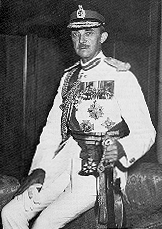Field Marshal Sir Gerald Walter Robert Templer, KG, GCB, GCMG, KBE, DSO (11 September 1898 – 25 October 1979) was a senior British Army officer. He fought in both the world wars and took part against the Arab Resistance in Palestine.[2] As Chief of the Imperial General Staff, the professional head of the British Army between 1955 and 1958, Templer was Prime Minister Anthony Eden's chief military adviser during the Suez Crisis. He is also credited as a founder of the United Kingdom's National Army Museum.
Templer is best known for implementing strategies that heavily contributed to the defeat of the Malayan National Liberation Army (MNLA) during the Malayan Emergency. Some historians have described his methods as a successful example of a "hearts and minds" campaign, while other scholars have dismissed this as a myth due to his over-reliance on population control and coercion.[3][4] Templer also oversaw, ordered, and personally approved of many controversial policies and numerous atrocities committed by his troops. These including the use of internment camps called "New Villages", the forced relocation of ethnic minorities,[5] forced conscription,[3] collective punishment against civilians,[3] the hiring of specialist Iban-headhunters to decapitate suspected communists,[3][6][7][8] pioneering the use of Agent Orange (later used in Vietnam),[3][9] and the use of scorched earth policies deprive the MNLA of resources.[10]
Many of the strategies he enforced were later (unsuccessfully) implemented by the United States in Vietnam.[11]
- ^ "Field-Marshal Sir Gerald Walter Robert Templer..." www.findagrave.com.
- ^ Newsinger, John (2015). British Counterinsurgency 2nd edition. Basingstoke: Palgrave Macmillan. p. 54. ISBN 978-0-230-29824-8.
- ^ a b c d e Cite error: The named reference
:3was invoked but never defined (see the help page). - ^ Elkins, Caroline (2022). Legacy of Violence: A History of the British Empire. Knopf Doubleday. pp. 535–536. ISBN 978-0-593-32008-2.
- ^ Cite error: The named reference
:4was invoked but never defined (see the help page). - ^ Cite error: The named reference
:0was invoked but never defined (see the help page). - ^ Cite error: The named reference
:1was invoked but never defined (see the help page). - ^ Cite error: The named reference
:2was invoked but never defined (see the help page). - ^ Cite error: The named reference
:5was invoked but never defined (see the help page). - ^ Cite error: The named reference
:6was invoked but never defined (see the help page). - ^ Tilman, Robert O. (1 August 1966). "The Non-Lessons of the Malayan Emergency". Far Eastern Survey. 6 (8) – via University of California Press.
